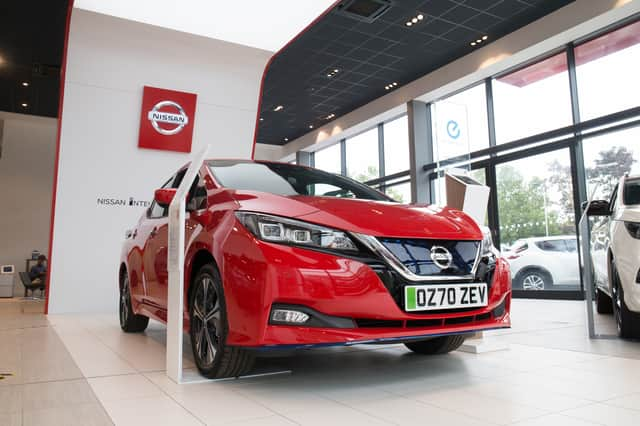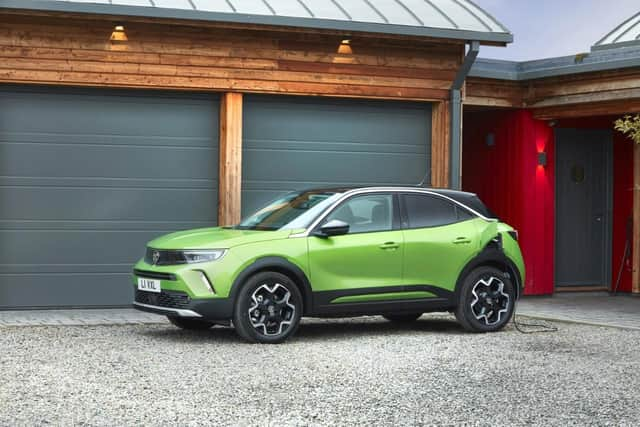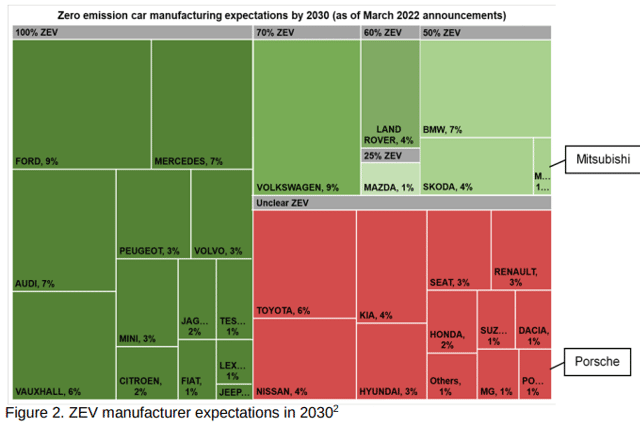Half of all new car sales will have to be all-electric models by 2028 under EV mandate


Car makers will be forced to ensure more than half of their new model sales in Britain are zero-emmissions vehicles by 2028 under an EV mandate.
The Government plans to outlaw the sale of conventional petrol and diesel cars entirely by 2030 and a new Department for Transport (DfT) consultation has set out proposals for mandatory sales targets in the lead up to the total ban.
Advertisement
Hide AdAdvertisement
Hide AdPlans for an Zero Emissions Vehicle Mandate were first announced in Ocotber 2021 as part of the Government’s “Net Zero” strategy and the new technical consultation from the DfT lays out a proposed timescale, which will see car makers given legally binding targets from 2024 onwards.
Under the plans, from 2024, 22% of all a manufacturer’s new car sales would have to be zero emissions vehicles (EV or hydrogen powered), rising annually from there to 52% by 2028 and 80% in 2030.


While purely petrol or diesel cars will be banned by 2030, some hybrid vehicles will still be allowed until 2035, explaining the 20% allowance for CO2-emitting cars beyond 2030. The DfT says such cars will have to have “significant zero emission capability” but has still not explained what this means in practice. By 2035, 100% of all car maker’s new sales will have to be completely emissions-free.
Last year, 12% of all new car registrations were zero-emissions vehicles, although the EV/combustion engine split for each manufacturer is different.
Advertisement
Hide AdAdvertisement
Hide AdThe UK motor industry’s official body, the Society of Motor Manufacturers and Traders (SMMT) predicts that the rapid growth in EV uptake (which rose 122% between 2019 and 2020 and 97% between 2020 and 2021) will continue, reaching 16% of market share this year and 18% in 2023.
The DfT paper says setting a clear legal mandate for sales will provide market certainty, which will allow other government departments to plan for the shift to EVs. This includes the Treasury, which is set to lose billions in fuel duty and car tax as matters stand.
The paper notes: ”The mandate will give certainty about the minimum proportion of zero emission cars we expect to be supplied although consumer demand may naturally exceed this level. The mandate will provide assurance that we will meet our phase-out deadlines and carbon commitments.”
Many car makers, including Ford, Vauxhall, Mercedes and Volvo, have already announced their intention to be all-electric brands by or before the 2030 deadline but some major marques, including Toyota, Nissan and Kia have not set out clear plans.
Advertisement
Hide AdAdvertisement
Hide AdMike Hawes, chief executive of the SMMT said the ZEV mandate proposals were the “most ambitious of any major market in the world” and warned that the Government needed to make sure regulations encouraged customers to buy EVs, not just forced manufacturers to produce them.
He said: “The danger is that consumers will lack the incentive to purchase these new vehicles – vehicles that will remain more expensive than traditional petrol and diesel cars for a number of years to come – in the quantities needed, keeping their older, more polluting vehicles for even longer thereby undermining the carbon savings this regulation seeks to deliver. Market transformation is proven to work fastest when mandates are matched with incentives and, for automotive electrification, we also need commensurate and binding targets for infrastructure provision.”


He added that any mandate needed to be “pragmatic and flexible” to avoid becoming a “straightjacket” for the market.
The proposals outline various options for how the mandate will work, including issuing manufacturers “certificates” for each ZEV. These could either be a simple single certificate for every ZEV produced or could be weighted to reward vehicles that are cheaper, lighter, more energy efficient, have longer ranges or offer better battery/drivetrain warranties.
Advertisement
Hide AdAdvertisement
Hide AdThe consultation also includes proposals to allow manufacturers to trade certificates. This would allow a brand that can’t meet the mandated ZEV target buy certificates from another manufacturer that has outperformed the target. It could also allow brands to “bank” certificates from overproduction for future use.
Comment Guidelines
National World encourages reader discussion on our stories. User feedback, insights and back-and-forth exchanges add a rich layer of context to reporting. Please review our Community Guidelines before commenting.
